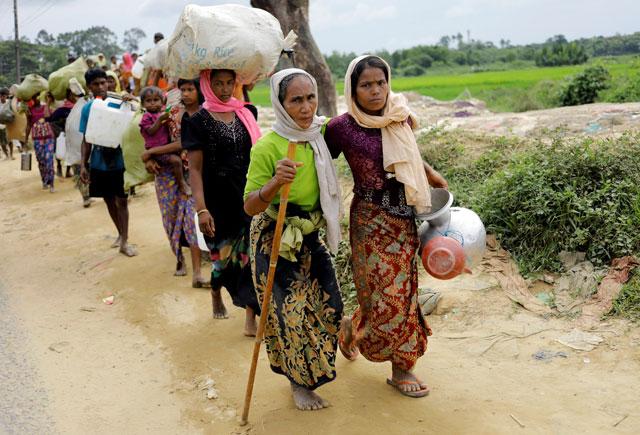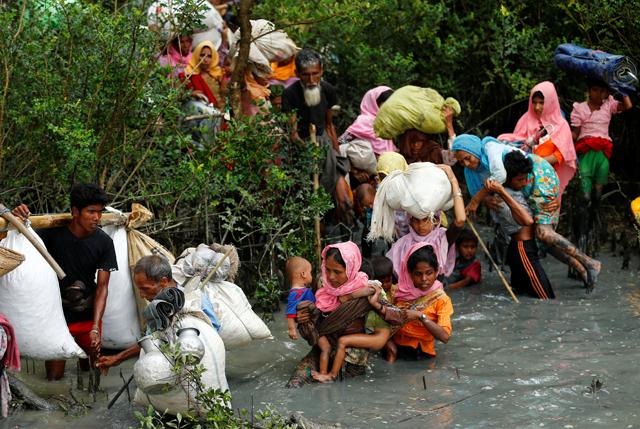You are here
Bangladesh lets stranded Rohingya into camps after screening
By AFP - Oct 19,2017 - Last updated at Oct 19,2017

Rohingya refugees, who crossed the border from Myanmar two days earlier, walk after they received permission from the Bangladesh army to continue their way to Kutupalong refugee camp, near Cox's Bazar, Bangladesh, on Thursday (Reuters photo)
COX'S BAZAR, Bangladesh — Thousands of Rohingya Muslims stranded near Bangladesh's border this week after fleeing violence in Myanmar have finally been permitted to enter refugee camps after "strict screening", officials said on Thursday.
The UN had expressed deep concern about the new wave of around 10,000 refugees, including children and elderly people who, dehydrated and hungry from the long journey, had been stopped from crossing the border into Bangladesh and left to squat in paddy fields.
It was not immediately clear why the new arrivals were being held in an area of no man's land, but the UN refugee agency had said it was calling on the Bangladesh authorities "to urgently admit" the group.
Border Guard Bangladesh spokesman Major Iqbal Ahmed told AFP on Thursday that the newcomers, who were blocked at Anjumanpara near the border town of Ukhiya, had been screened "very carefully" to stop "unwanted visitors".
"After strict checking, they are being taken to the extended Kutupalong camp where they will receive some basic goods and later will be shifted to another camp," said Ahmed.
Excluding the latest wave, the UN says some 582,000 Rohingya refugees had fled Myanmar for Bangladesh since late August, when militant attacks on Myanmar's security forces in Rakhine state sparked a major army crackdown.
But Bangladesh, which has been overwhelmed by the influx of people fleeing the violence, is wary of radical Islamists getting into its refugee camps where there are now more than 800,000 Rohingya in all.
Many of the new arrivals were from Rakhine's Buthidaung district, which lies relatively far from the border with Bangladesh.
Some told an AFP correspondent they had trekked for days to reach the border as their villages remain under military surveillance and they had nothing to eat.
"We ran out of food," said Shamser Alam, 21, from Yin Ma Kyaung Taung village near Buthidaung town.
"There is no village market. There are too many restrictions. We don't have freedom. Not more than five people can pray together."
Sufia Khatun, a mother of four, said one of her sons was killed in a stampede after Buddhist militants attacked her village.
"We ran for our lives and I lost Jalal. Later I found he was killed in the stampede," she told AFP.
Sanjida Khatun, from Phone Nyo Lake village who tried to escape with her husband Mohammad Amin, three sons and a 15-day-old baby, said she was attacked by armed men while
going to the border.
"They indiscriminately hacked my husband to death. I narrowly escaped with my sons," she said.
Related Articles
SHAH PORIR DWIP, Bangladesh — Rohingya refugees arriving in Bangladesh amid a fresh exodus from strife-torn Myanmar have described whole vil
DHAKA — Bangladesh Prime Minister Sheikh Hasina headed for the UN General Assembly on Saturday to plead for global help coping with the Rohi
COX'S BAZAR, Bangladesh — More than a quarter of a million mostly Rohingya refugees have entered Bangladesh since fresh violence erupted in














